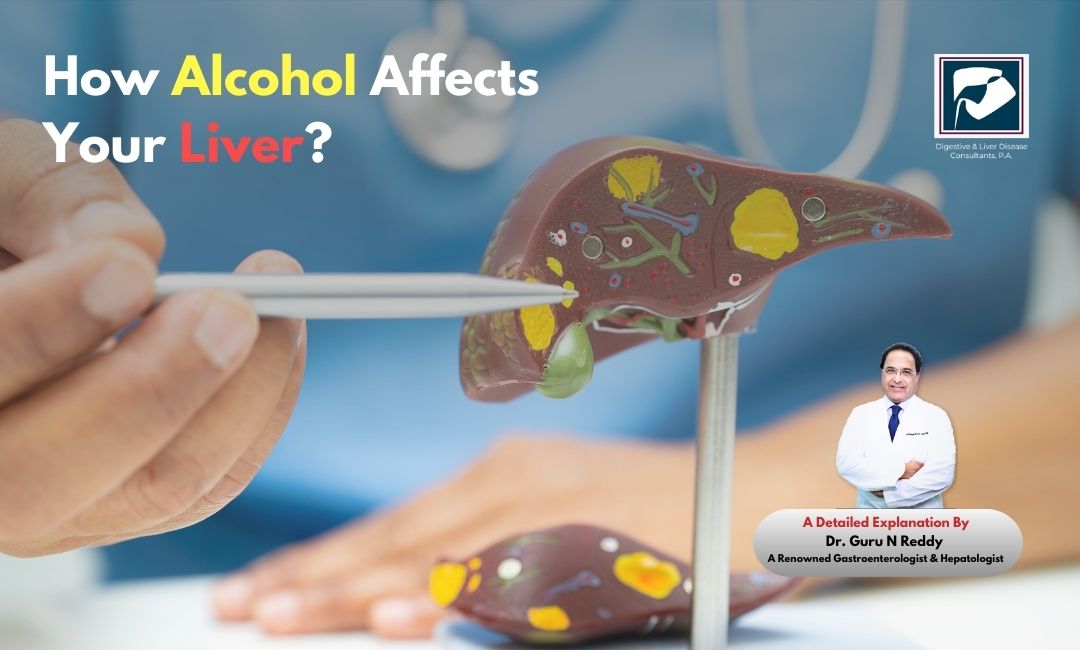The liver is one of the most important organs in your body. It performs a variety of crucial functions, including filtering toxins from the blood, producing bile to help with digestion, and storing nutrients and energy. However, the liver is also highly sensitive to substances like alcohol, and drinking excessively or regularly can lead to serious liver damage over time.
In this blog, we’ll explore how alcohol affects your liver, the potential consequences of heavy drinking, and how you can take steps to protect your liver health.
Understanding How Alcohol Impacts the Liver
When you consume alcohol, it is absorbed into your bloodstream and carried to the liver. The liver processes the alcohol by breaking it down, making it less harmful to your body. This is because the liver contains enzymes that metabolize alcohol, mainly by converting it into acetaldehyde, a toxic substance. The liver then breaks down acetaldehyde into acetate, which is eventually excreted from the body.
While the liver is efficient at processing alcohol, it has its limits. When you drink more alcohol than your liver can process, it can start to damage liver cells. Over time, excessive alcohol consumption can cause a range of liver problems.
The Different Stages of Liver Damage from Alcohol
Fatty Liver (Alcoholic Steatosis)
The first stage of alcohol-related liver damage is fatty liver disease. When you drink alcohol, your liver can become overloaded with fat deposits. This is known as fatty liver, and it often doesn’t cause any symptoms in the early stages. However, if left untreated, fatty liver can develop into more serious conditions.
Symptoms: You may not feel sick during this stage, but some people report feeling tired or having discomfort in the abdomen. Fatty liver is usually detected through blood tests or imaging.
Alcoholic Hepatitis
If alcohol consumption continues, it can cause inflammation in the liver. This is known as alcoholic hepatitis. The liver becomes swollen and irritated, and liver function begins to decline. In this stage, the liver cells are more damaged, and the liver’s ability to process toxins decreases.
Symptoms: Symptoms of alcoholic hepatitis may include jaundice (yellowing of the skin and eyes), nausea, vomiting, abdominal pain, fever, and a feeling of general weakness. In severe cases, alcoholic hepatitis can be life-threatening.
Cirrhosis
If heavy drinking continues over many years, it can lead to cirrhosis, the most severe form of alcohol-related liver disease. Cirrhosis occurs when the liver becomes scarred from years of inflammation. The scar tissue prevents the liver from functioning properly, and it may eventually lead to liver failure.
Symptoms: Cirrhosis can cause serious complications, including swelling in the legs and abdomen, confusion, bleeding easily, and a buildup of toxins in the blood. Liver failure is a life-threatening condition that may require a liver transplant.
The Risks of Heavy Drinking
The more you drink, the greater your risk of liver damage. Here’s what you need to know about heavy drinking and its effects on your liver:
Binge drinking: Consuming large amounts of alcohol in a short period, such as binge drinking, can put significant strain on your liver. Even one episode of binge drinking can lead to fatty liver disease or alcoholic hepatitis.
Chronic drinking: Drinking large amounts of alcohol over time—especially daily or several times a week—can lead to progressive liver damage, increasing the risk of cirrhosis and liver cancer.
Drinking and other health conditions: If you already have other health conditions, such as diabetes, obesity, or high blood pressure, excessive drinking can worsen these issues and increase the risk of liver damage.
How Much Alcohol Is Safe?
The key to preventing alcohol-related liver damage is moderation. The Centers for Disease Control and Prevention (CDC) defines moderate drinking as:
For men: Up to two drinks per day.
For women: Up to one drink per day.
One "drink" is equivalent to:
- 12 ounces of beer
- 5 ounces of wine
- 1.5 ounces of distilled spirits (like whiskey or vodka)
Drinking in moderation allows your liver to process alcohol without becoming overwhelmed. However, if you find it difficult to control your alcohol consumption or drink in excess frequently, it’s essential to seek help.
Warning Signs of Liver Damage
Your liver is a resilient organ, but it can only handle so much damage before symptoms begin to appear. Here are some common warning signs that your liver may be struggling:
- Unexplained fatigue or weakness
- Yellowing of the skin or eyes (jaundice)
- Pain or tenderness in the upper right side of the abdomen
- Nausea or vomiting
- Swelling in the legs or abdomen
- Dark-coloured urine or pale-coloured stools
If you notice any of these symptoms, it’s crucial to consult a doctor immediately. Early intervention can help prevent further liver damage.
Protecting Your Liver: Healthy Habits
The best way to protect your liver is by making healthy lifestyle choices. Here are a few tips for maintaining liver health:
Drink in moderation: Stick to the recommended limits for alcohol consumption.
Eat a balanced diet: Focus on a diet rich in fruits, vegetables, whole grains, and lean proteins.
Exercise regularly: Aim for at least 150 minutes of moderate-intensity exercise each week.
Stay hydrated: Drink plenty of water throughout the day to help your liver function properly.
Avoid risky behaviours: If you use substances such as recreational drugs, ensure you do so in a safe and responsible manner.
Conclusion: Take Care of Your Liver
Your liver is a vital organ that works hard to keep your body healthy. While occasional alcohol consumption may not pose a significant risk to liver health, drinking in excess or over a long period can lead to serious conditions like fatty liver disease, alcoholic hepatitis, cirrhosis, and liver cancer.
If you suspect alcohol is affecting your liver health or need help managing liver disease, contact DLDC (Digestive & Liver Disease Consultants P.A.) today.






